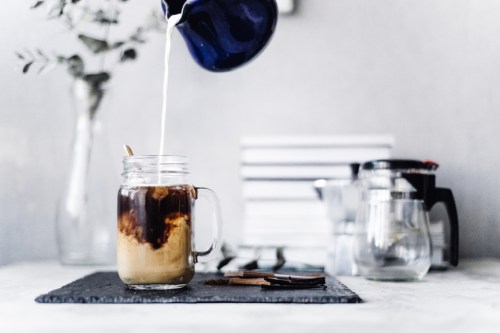Are You Keeping Your Cold Brew Too Long? Here’s How Long Food Scientists Say It *Actually* Stays Fresh
A food scientist and a coffee educator answer the age-old question: How long does cold brew last? Plus, cold brew coffee storage tips.

Even though it seems like the brutal heatwave is behind us, there are still a few weeks left of warm weather season, which means we’ll be keeping cool (and caffeinated) with a glass of cold brew coffee at least twice daily. Whether store-bought or homemade, this icy concoction is a non-negotiable staple in our homes all summer long.
Experts in This Article
director of coffee, Partners Coffee
However, if you’re slower to sip your batch of cold brew than we are (kudos, honestly) or you go on vacation and come home wondering whether it’s still okay to chug the coffee that’s been chilling out in your fridge for a couple of weeks, the answer is… probably not. Here’s what you need to know about keeping cold brew fresh—including how long it lasts and ways to extend its shelf life—according to coffee experts.
How long does cold brew last?
In short, it depends on whether your coffee is homemade or store-bought. “If you are brewing your cold brew at home, I recommend keeping it refrigerated and drinking it within one week of brewing,” says Cary Wong, a coffee educator at Partners Coffee. One of our favorite DIY options is Partner Coffee’s Rockaway Cold Brew Pouches, which make just three to five cups of cold brew to last you a few days—just be sure to dispose of any leftovers after one week.
As for store-bought cold brew, manufacturers generally list the brew date and expiration date on the packaging. “As a rule of thumb, any cold brew made in a commercial facility can be good to drink for up to four to six months from the brew date on the package so long as it’s left unopened,” says Wong.
And FYI: Canned cold brew coffee is the safest product to drink from a longevity perspective. “It should be shelf stable to the point of expiration date on the can,” says Martin Bucknavage, a food safety expert at Penn State Extension.
The good news is that your cold brew probably won’t get moldy if you keep it too long—however, it can still be a home to pathogens. “Cold brew naturally has some antimicrobial properties, so it’s not prone to contamination,” says Bucknavage. So where’s the risk? “We do know that organisms like salmonella and listeria can survive in a cool environment for an extended period of time.”
However, those types of foodborne pathogens are rarely found in hot or cold coffee products, so the presence of such bacteria in homemade cold brew coffee is unlikely. To minimize the risk, drink your homemade brew within one to seven days and don’t store it for an extended period of time.
Does the type of water matter?
If you’re making DIY cold brew coffee, does filtered, mineral, or tap water make a difference? “From a flavor perspective, yes, but not from a microbial level,” says Bucknavage. So long as the water is drinkable, it’s safe to use for brewing coffee.
What if you keep cold brew for too long?
It happens to the best of us—you reach in the back of your fridge and pull out a murky mason jar of cold brew that you brewed a long time ago…but you don’t remember exactly how long ago. So how do you know if it’s safe to drink?
According to Wong, your best bet is to take a small sip and see how it tastes. “If cold brew is kept for too long, you might notice the flavors start to decline and it might begin to taste slightly rancid and bitter,” he says. This process is known as oxidation, says Bucknavage, and will create certain “off” flavors.
Bucknavage adds that yeast, lactic acid bacteria, and other spoilage bacteria can grow the longer that cold brew coffee sits, which can cause it to sour and ferment like alcohol. However, there will rarely be any visual indicators that prove it’s past its peak. To avoid any uncertainty, label cold brew with the date you brewed it and a “best by” date (FWIW: Do this with leftovers and your weekly meal prep, too).
How to extend the shelf life of your cold brew coffee
To store cold brew coffee for up to one week, keep it in an airtight container, such as a mason jar, and cover it. Place it in the refrigerator and keep it a cold refrigerator set to at least 36℉.
The only way to safely extend the life of homemade cold brew coffee for weeks or months on end would be to pasteurize the batch, which is a more laborious process than the average home brewer is probably up for. Wong recommends simply brewing smaller batches at a time. “This way, you can enjoy fresh cold brew more frequently without worrying about it losing its flavors if kept for too long,” he says. Sounds like an A+ plan, no?








